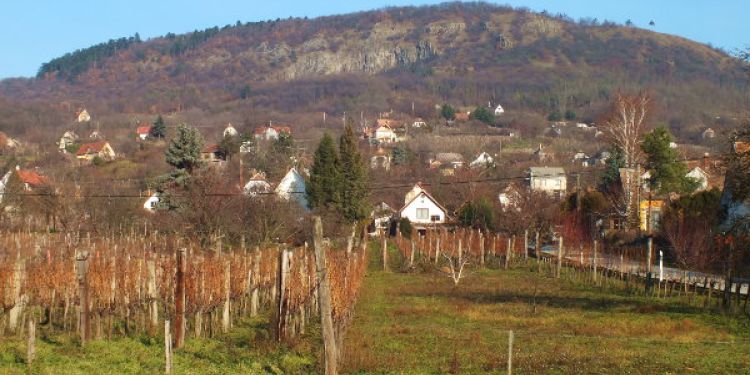Where are you from, Kevin, and what are you doing nowadays?
I am an American citizen. Before I came to Hungary, I lived in both the US and Switzerland where I started and ran software companies specializing in databases and analytical software for scientific and conservation topics. Nowadays, I spend most of my time renovating and improving my wife's vineyard land in Hungary.
Why did you choose to expatriate to Hungary?
My wife is a dual Swiss-Hungarian citizen. We lived in Switzerland for many years and commuted many times a year to Hungary where we had a house and to visit her family. We eventually decided to simply move to Hungary full-time as Switzerland was not providing the lifestyle or quality of life we desired.
What were the procedures to follow for a US national to move there?
As the spouse of a Hungarian citizen, I applied for Hungarian residency under the family reunification law. The process required me to prove fiscal independence, insurance coverage, legal background check, a place or residence in Hungary and other details. I currently have a permanent residency permit in Hungary.
How long have you been in the country?

I first came to Hungary in 1998 for business reasons as I was attending an international conference where my business was a display vendor. During that trip, I first met my future wife who was actually living in Switzerland at the time. My wife and I got married in Switzerland and we first lived in Switzerland for many years. We moved o Hungary from Switzerland in 2007.
What has attracted you to Hegymagas?
Basically, a feeling of home. The Badacsony wine region of Hungary, where my wife's parents lived and where we took our Hungarian vacations and eventually bought a house, looked a lot like the wine country in the US where I had spent a great deal of time. And so I felt "at home" here. And I always wanted to have a winery. So we ended up settling in this wine region.
Was it difficult to find accommodation there? What are the types of accommodation which are available?
There was never a problem finding accommodations. I often stayed with my wife's family when we did not yet have a place of our own in Hungary. But even when we traveled around Hungary, then or till today, we have never had any problems finding accommodations at reasonable rates. There are camp grounds, hostels, pensions and 5-star hotels. Hungary has options for any type of traveler.
What surprised you the most at your arrival?
I first arrived in Hungary in 1998. At that time, I was quite surprised by how many towns or villages had sold to either Coke or Pepsi the right to paint their water towers to look like either a giant Coke or Pepsi soda can. It gave a feeling of a nation that "sold out". It was quite a surprising thing to see. Today, the water towers have been painted back to a normal single color.
How do you find the Hungarian lifestyle?
Coming from an American 24 hours/7 days a week always on and open society, the lifestyle in Hungary is more temporally relaxed and yet more limiting and regulated. For example, stores often close much earlier in the day (often at 5 pm on week days and at noon on Saturdays) than their counterparts in the US. Government offices in Hungary may be only open to the public on certain days and at limited hours. I live in the countryside where the local village church clock rings at 5 am in the morning to wake you up and again at 8 pm in summer and 7 pm in winter to announce the end of the day. So the daily rhythm is more group-determined than individually regulated.

Have you been able to adapt yourself to the country and to its society?
I see the question and my answer in two parts. First, there is the general concept of adapting to the national culture, traditions, and society in a larger sense. In this regard, I mostly see myself as a guest in Hungary and I try to act as a good guest should act. Good respectful manners and personal politeness is an almost universal act of good will. So I do try to be a respectful guest. As regards the country itself, I adapted to it quickly. I think it is a lovely region of Europe. I like the history and local traditions, the country's geography, climate and the local environment in general.
But then there is the second part, which is more on the level of smaller social personal interactions. Here, the differences between how Hungarians versus Americans expect individuals to act becomes more acute for me. I am certainly not shy but I prefer being alone with my own thoughts rather than conducting small talk. I am goal-oriented and like to get directly to the point (even bluntly if necessary): basically an introvert personality type and almost the antithesis of what many Hungarians expect of me at small social events.
Unfortunately, this is a cultural gap I may never bridge with some people or some parts of society here. So being an independent-minded American introvert does limit my social adaptivity in Hungary to some degree. My blunt American introvert tendencies also play out in some comical ways in Hungary. To put this directly, I have found there is often a Hungarian way of doing some things. Adapting to this has been a little more difficult for me because the Hungarian way often differs from my more direct, goal-oriented, solution-minded way of thinking. My wife summarized it best by saying, "sometimes to get something done in Hungary, the shortest path is to go the longer way".
As an example, let us say I need a widget made. In America, my short path is to simply ask someone to create the widget the way I want it. In Hungary, doing so may result instead with a widget being made how the other person thinks my widget should be made. The "American" shortest path from request to solution is not a simple straight line here. Here, I may have to explain why I need the widget made the way I want it, how it will work if made my way, why their way of making a widget will not work for what I need, etc. They like to be included in the entire process - group efforts appear to be prioritized here.
When I can adapt to the need to do that long path, then I can get a widget made the way I want it. When I cannot adapt to the longer way, I tend to instead end up doing it myself (which is then a different self-imposed longer, shorter path). Rather than explain everything, I often do many tasks independently and by myself, rather than try too hard to make it a group effort (and being more an introvert I actually like doing personal projects alone so this is not a problem for me). But I still have had those passing by inject a comment how I should do my task at hand, turning my single effort into a group effort.
In any case, no project I do here goes without comment of some type and in some form. For example, in my wife's vineyards, I may use some American vineyard methods, which differ from local, traditional methods. But yet, and of course, one will then invariably find this filed in the local gossip network under the circular opinion that I do it "wrong". I take this all in stride with a smile and a dose of good humor.
What does your every day life look like in Hegymagas?

Rather mundane actually. I get up, make a cup of coffee, and review for myself what I need to do for the day. My daily tasks are seasonal. Half of the year, I spend a great deal of time outdoors in the vegetable garden or in the vineyards. I am also renovating our house in Hungary and a lot of the indoor finishing work I do in the winter months. So I am always busy.
Any particular experience in Hungary you would like to share with us?
What may be somewhat unique among expats is the fact that my wife, as a Hungarian citizen, was elected as the mayor of our village and served in that capacity for four years, and then was asked by one of the national parties of Hungary to run for a seat in Parliament.
What is your opinion on the cost of living in Hungary?
It varies. Locally made goods are very inexpensive. I can buy a pair of thick, warm, high quality winter socks made locally in Hungary for 600 Hungarian Forint (about $2 US Dollars). Similar socks would be much more expensive in the USA. I had a slice of chocolate cake the other day for 160 Hungarian Forint (that would be about 50 cents in the USA), and that included the high 27% VAT that no one in America has to pay. You can not beat that. Imported goods from Western EU countries are often more expensive because they have the basic western price, and then the local high Hungarian VAT added to them makes them less affordable. Being self-employed in Hungary can be much more difficult as the combined income and social taxes are higher than what I experienced in either the USA or Switzerland.
Is it easy for an expat to live there?
I used to travel a great deal around the world on business and I stayed in many countries for extended periods. For me, the greatest hurdle was always the language issue. So, my little rule of thumb was to learn immediately at least three words in the local language for the three "essentials" in life and to make living there easier. These three words are: water, bread and beer. In Hungarian those are "víz", "kenyér" and "sör".
Hungary is a socially polite county and being socially polite opens many doors here. So to make living here also easier.
I also recommend to learn the Hungarians words for "hello", "goodbye", and "thank you". When you enter a store or meet someone, always say "jo napot" and when leaving or parting always say "viszontlátásra" (or if that is too tongue twisting, just shortening it to "viszlát" also works).
How do you spend your leisure time?
I am what many call a "workaholic". Almost everything I do has a purpose. For example, if I spend time in the garden, I am growing food. I love cycling, but I do it for not just my enjoyment, but also for my health. I enjoy adding my comments on the Expat Blog forum, but even there I see a purpose in trying to help expats navigate issues in Hungary. Even if I am reading, I am more likely to read a biography for my edification than a novel. But my wife has introduced me to many novels, including Hungarian novels, that also add to my understanding of Hungary. That is the closest I come to a leisure activity.

Your favorite local dishes?
Hungarian desserts are my favorite. If you have a sweet tooth, Hungary can satisfy it. My favorite dessert in Hungary is a nut cake called Eszterházi Torta.
What are the differences between life in the US and in Hungary?
The life pace is slower in Hungary. Which I like. The 24/7 always on, always open American lifestyle I do not miss.
What do you like the most about Hungary?
The history that is everywhere you look. I grew up in a US city that did not even exist 200 years ago. Now, each day I walk out the front door of our house in Hungary and see a 13th century castle fortress on a nearby hill. Even after all the years I have lived here, I still find that amazing.
What do you miss the most about your home country?
Not much actually. The world in shrinking. I can read the US news on my computer. If I want something, I can order it on-line. For good or bad (depending on one's world view), there are McDonalds and Starbucks in Hungary.
Would you like to give any advice to soon-to-be expatriates in Hungary?
Their country, their rules. Yet, at the same time get to know your rights, since some in Hungary will try to take advantage of you if you do not know and press your rights.
What are your plans for the future?
I have spent a great deal of time renovating our home here and I planted thousands of new wine vines (which take at least five years to bear fruit). When these new vines start to produce, I would like to start a wine business. So my plans in Hungary are definitely long term.

















Contact us to be featured in the Interviews section.
Participate